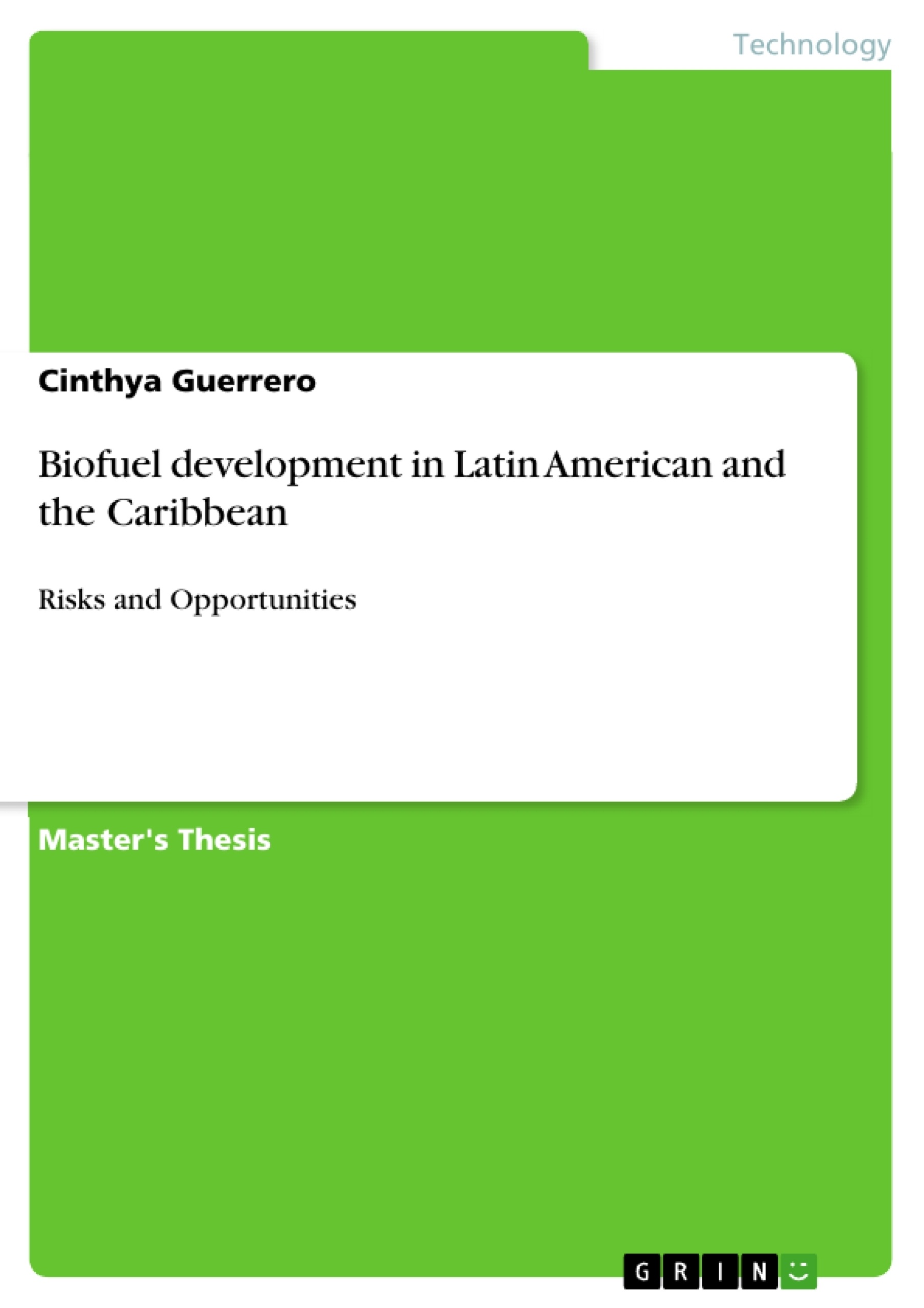In the light of availability concerns and environmental implications of fossil fuels, attached with the remarkable rise in the price of oil during the past several years; biofuels are getting a significant increase in interest worldwide from governments, private investors, farmers and the public in general.
Nevertheless, the use of cropland for biofuels had become a very controversial topic. On one hand, promoters state that biofuels represent opportunities to increase the energy security and to generate environmental and social benefits (through greenhouse gases emissions reductions and poverty alleviation through rural development respectively).
On the other hand, topics such as the effects on food prices and availability, soil fertility and erosion, competition for scarce land and water resources and biodiversity loss are also widely discussed as important concerns related to further development of bioenergy.
Notwithstanding this, several developing countries around the world are turning into the biofuels direction to satisfy the demand of developed countries while contributing to their economical growth and/or diversifying their current options of energetic arrangements.
For Latin America and the Caribbean (LAC), a geographical area with privileged natural resources; home-grown energy crops emerge as an appealing possibility, especially given the example of Brazil, a historical leader in ethanol production.
After assessing some core elements of the biofuel’s debate, the evidence seems to suggest that biofuels may represent a valuable source of renewable energy. Nonetheless, in order to represent a promise to the LAC region, local governments will be required to firmly normalize land use and agricultural activities, while cautiously shaping public policies. Whether the biofuels’ boom will represent an opportunity or a risk for the LAC region would depend on how each country regulate agricultural and manufacturing practices, including how many small farmers and workers from rural areas would benefit from the industry.
Keywords: Renewable resources, Biofuels risks and opportunities, Latin America and the Caribbean, Ethanol, Biodiesel, Food vs. Fuel debate, GHG reduction, Holistic approach to biofuels.
Inhaltsverzeichnis (Table of Contents)
- Introduction
- Motivation
- The area under investigation
- Research objectives and scope
- Intended significance
- Structure of the paper
- Research methodology
- Global energetic overview
- Latin America and the Caribbean: Regional profile
- Natural resources
- Latin America and the Caribbean: Regional profile
- Biofuels and their production
- Definition of biofuels
- Sources of biofuels
- Alternative biofuels production pathways
- Vehicle fuel compatibility
- Biofuels globally
- Production
- Consumption
- Future perspectives
- Definition of biofuels
- Brazil
- Outlook
- History
- Is Brazil ethanol really a model to follow?
- Latin America & the Caribbean and the use of bioenergy
- Latin America and the Caribbean: biofuels drivers
Zielsetzung und Themenschwerpunkte (Objectives and Key Themes)
This Master's thesis investigates the potential of biofuels development in Latin America and the Caribbean. It aims to analyze the risks and opportunities associated with this industry, considering factors like food security, environmental impact, and economic development. The thesis explores the region's natural resources and existing biofuel production infrastructure, comparing them to the Brazilian model. Key themes covered in this study include: * **Renewable energy sources**: Evaluating the role of biofuels in achieving energy independence and reducing reliance on fossil fuels. * **Food security vs. fuel production**: Examining the potential impact of biofuel production on food prices, availability, and land use. * **Environmental sustainability**: Assessing the environmental impact of biofuel production, including greenhouse gas emissions, biodiversity conservation, and water resources. * **Economic development and social equity**: Analyzing the potential of biofuels to stimulate economic growth and create employment opportunities in the region.Zusammenfassung der Kapitel (Chapter Summaries)
The introductory chapter lays the groundwork for the research, outlining the motivation, research objectives, scope, and methodology. It also provides context for the study by defining the geographical area of investigation. Chapter 2 delves into the global energy landscape, focusing on Latin America and the Caribbean's regional profile. This chapter highlights the region's natural resources, which are significant for the biofuel development potential. Chapter 3 delves into biofuels and their production, defining the various sources, production pathways, and fuel compatibility. It provides a global overview of biofuel production, consumption, and future perspectives. Chapter 4 focuses on Brazil, examining the country's history with biofuels, its current production practices, and the future prospects of its ethanol industry. It analyzes whether the Brazilian model is replicable in other Latin American and Caribbean countries. Chapter 5 explores the specific case of Latin America and the Caribbean, examining the drivers for biofuel development and their potential implications for the region.Schlüsselwörter (Keywords)
The main keywords for this thesis are: renewable resources, biofuels risks and opportunities, Latin America and the Caribbean, ethanol, biodiesel, food vs. fuel debate, GHG reduction, holistic approach to biofuels. These terms represent the core concepts explored in the text, encompassing the major themes of energy security, environmental impact, and economic development.Frequently Asked Questions
What are the main drivers for biofuels in Latin America?
The main drivers are energy security, the reduction of greenhouse gas emissions, and the potential for rural development and poverty alleviation.
What is the "Food vs. Fuel" debate?
It refers to the controversy over whether using cropland for biofuel production increases food prices and reduces food availability for local populations.
Is the Brazilian ethanol model replicable in other countries?
While Brazil is a leader in ethanol, the study examines if other LAC countries have the necessary natural resources and public policies to replicate its success.
What environmental risks are associated with biofuels?
Potential risks include soil erosion, loss of biodiversity, and excessive competition for scarce water resources in certain geographical areas.
How can local governments ensure the success of the biofuel industry?
Success depends on firm regulation of land use, cautious public policies, and ensuring that small farmers and rural workers benefit from the economic boom.
- Quote paper
- MSc. Cinthya Guerrero (Author), 2008, Biofuel development in Latin American and the Caribbean, Munich, GRIN Verlag, https://www.hausarbeiten.de/document/127647


